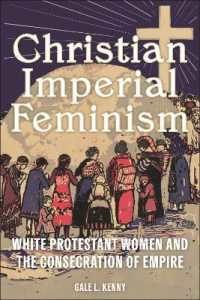- ホーム
- > 洋書
- > 英文書
- > Politics / International Relations
Full Description
Utilizing a new and original framework for examining the role of intellectuals in countries transitioning to democracy, Bozóki analyses the rise and fall of dissident intellectuals in Hungary in the late 20th century. He shows how that framework is applicable to other countries too as he forensically examines their activities.
Bozóki argues that the Hungarian intellectuals did not become a 'New Class'. By rolling transition, he means an incremental, non-violent, elite driven political transformation which is based on the rotation of agency, and it results in a new regime. This is led mainly by different groups of intellectuals who do not construct a vanguard movement but create an open network which might transform itself into different political parties. Their roles changed from dissidents to reformers, to movement organizers and negotiators through the periods of dissidence, open network building, roundtable negotiations, parliamentary activities, and new movement politics.
Through the prism of political sociology, the author focuses on the following questions: Who were the dissident intellectuals and what did they want? Under what conditions do intellectuals rebel and what are the patterns of their protest? This book will be of interest to students, researchers, and public intellectuals around the world aiming to promote human rights and democracy.
Contents
List of Tables, List of Figures, Abbreviations, Acknowledgments, Introduction, Chapter I. The Role of Intellectuals: Theories and Interpretive Frameworks, Chapter II. The Political Context: Censorship and Co-optation, Chapter III. Dissident Intellectuals: The Culture of Critical Discourse, Chapter IV. From Moral Principles to Political Action, Chapter V Regime Change and Elite Change, Chapter VI. Negotiated Revolution: The Strategy of the Opposition, Chapter VII. Intellectuals as Legislators







